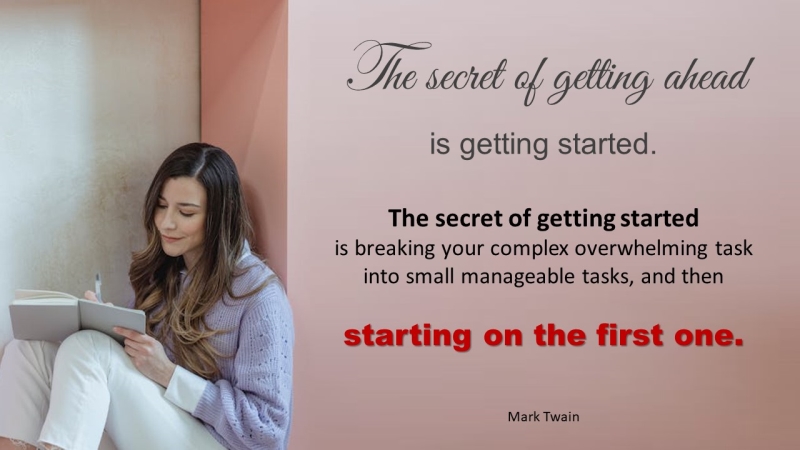WELCOME, MY DEAR READERS, TO THIS ARTICLE THAT WILL CHANGE YOUR PERSPECTIVE ON ACHIEVING SUCCESS! Have you ever felt overwhelmed by the enormity of your goals and the tasks that come with them? Perhaps you have big dreams, but pursuing them makes you feel anxious and unsure. Well, you’re not alone. Many people struggle with this feeling, which can be challenging to overcome. However, the good news is that there’s a way to tackle this problem and move forward confidently. The secret lies in breaking down big tasks into small wins, which is precisely what we will discuss in this article.
Setting big goals is crucial for achieving success. It gives you something to work towards, a reason to wake up and strive for something bigger than yourself. With a crystal-clear vision of your desired destination, you’ll be empowered to take the necessary steps to reach it. Keep your sights fixed on the goal, and let your unyielding resolve lead you to success. However, setting big goals can also be daunting, especially if they seem impossible. That’s where breaking them down into smaller tasks becomes essential.
When faced with a massive goal, it’s easy to feel overwhelmed, stressed out, and unsure where to begin. This feeling of paralysis can be debilitating, leading to procrastination, self-doubt, and a lack of progress. When you’re overwhelmed, seeing the path forward is challenging, and you may even question if the goal is worth pursuing.
Fortunately, there is a solution, and it’s a simple one. The key to success is breaking down big tasks into small wins. Every small win will give you a sense of progress and accomplishment, helping you build momentum and the confidence to keep going. By dividing a large project into smaller, more manageable tasks, you’ll create a clear path forward that will help you stay motivated, focused, and on track.
Set big goals and break them into smaller, more doable activities to succeed. This method will help you stay motivated and focused on your goals. Every single step puts you closer to your dreams. So, keep pushing yourself and always keep sight of the bigger picture. You’ve got this! Doing so will help you stay focused, motivated, and on track, even when faced with complex challenges. Remember, every small win counts, so celebrate your progress and keep pushing forward toward your ultimate goal.
Why Breaking Down Big Tasks is Important
Have you ever tried to tackle a big project all at once, only to find yourself feeling exhausted, unmotivated, and overwhelmed? The human brain is programmed to function more effectively when activities are divided into more manageable, smaller chunks. Let’s examine why breaking down big tasks is essential for success.
How the Brain Works
The brain has a limited capacity for processing information. When presented with an enormous task, the brain can become overwhelmed, leading to feelings of anxiety, stress, and even paralysis. This is because the brain has to work harder to process and organize information, which can be mentally draining. Breaking down tasks into smaller pieces makes it easier for the brain to process and categorize information, reducing the strain on the brain and making it easier to focus on the task at hand.
Benefits of Breaking Down Tasks into Smaller Parts
Breaking down big tasks into small wins has numerous benefits, including:
Increased Productivity: When you break down a big task into smaller pieces, it becomes easier to make progress and stay motivated. Each small win gives you a sense of accomplishment, which can help boost your productivity and keep you moving forward.
Motivation: When you set small, achievable goals along the way, you’ll be more motivated to stay on track and see the project through to completion. These small goals can help you build momentum and create a sense of progress, which is essential for staying motivated over the long term.
Confidence: As you achieve each small win, you’ll build confidence in your abilities and feel more confident about tackling the next task. This can help boost your self-esteem and give you the courage to take on even more significant challenges in the future.
Breaking down big tasks into small wins is a powerful strategy for achieving success. You’ll do this to relieve mental stress, boost productivity, maintain motivation, and gain confidence in your skills. So, if you’re feeling overwhelmed by a big project, take a step back, break it down into smaller tasks, and start progressing towards your goal, one small win at a time.
Strategies for Breaking Down Big Tasks
Breaking down big tasks into small wins can be a game-changer when achieving your goals. Here are some strategies to help you break down your big tasks into smaller, more manageable pieces:
Tips for Identifying Specific Steps
One of the first steps in breaking down a big task is identifying the steps you’ll need to take to achieve your goal. To do this, try the following:
• Brainstorm: Start by brainstorming all the steps that come to mind. Don’t worry about putting them in order yet. Just get all your ideas down on paper.
• Categorize: Once you have a list of potential steps, categorize them into groups based on their purpose. With this, you’ll be able to see the overall picture and spot any puzzle pieces.
• Prioritize: Finally, order the items on your list according to which ones must be completed first, which ones may wait until later, and which ones depend on others.
How to Prioritize Tasks
Once you have a list of specific steps, the next step is prioritizing them. This will enable you to concentrate on the most crucial activities to finish your goal. Here are some tips for prioritizing tasks:
• Use the 80/20 Rule: The 80/20 rule states that 80% of your results will come from 20% of your efforts. Identify the 20% of tasks that will significantly impact achieving your goal and focus on them first.
• Consider Urgency: Determine which tasks have a deadline or are time-sensitive, and then prioritize those accordingly.
• Break Tasks into Smaller Pieces: If a task is particularly large or complex, consider breaking it down into smaller pieces and prioritizing those.
The Benefits of Setting Small Goals
Setting small, achievable goals can help you stay motivated and build momentum. Here are some benefits of setting small goals:
• Increases Motivation: Small goals can help you build momentum and create a sense of progress, which can be incredibly motivating.
• Boosts Confidence: Achieving small goals can boost your confidence and give you the courage to take on even more significant challenges.
• Provides a Roadmap: Breaking down a big task into smaller goals provides a roadmap for success, making it easier to see your progress and stay on track.
Breaking down big tasks into small wins is an essential strategy for achieving success. By identifying specific steps, prioritizing tasks, and setting small, achievable goals, you’ll increase productivity, stay motivated, and build confidence in your abilities. Therefore, the next time you’re presented with a challenging task, remember this advice and concentrate on earning one small victory at a time.
Examples of successful people who broke down big tasks into small wins
It’s not just a theory—breaking down big tasks into smaller wins is a proven method for achieving success. Here are a few examples of people and companies who have achieved great things by focusing on small steps along the way:
Elon Musk – Tesla and SpaceX
Elon Musk, one of the most successful businessmen of our time, is renowned for setting lofty objectives. However, Musk only achieved success after some time. He had to break down his big ideas into smaller tasks to make them manageable. For example, before launching SpaceX, he had to learn about rockets and space travel. Then, he tackled one hurdle at a time, from designing a rocket engine to landing a spacecraft.
J.K. Rowling – Harry Potter series
J.K. Rowling is a shining example of someone who leveraged minor victories to accomplish significant objectives. Rowling completed the first Harry Potter novel before she realized it. From there, author J.K. Rowling continued to work on the series, one book at a time. She started by writing short stories and gradually built up to writing longer and longer pieces.
Apple Inc. – iPhone development
When Apple decided to create the iPhone, they knew it would be a massive undertaking. So, they broke the project into smaller tasks, such as making the touchscreen technology, designing the user interface, and developing the camera. They created one of the most ground-breaking pieces of modern technology by concentrating on one task at a time.
Nelson Mandela – ending apartheid.
Nelson Mandela is a true inspiration to us all. He spent years fighting for the end of apartheid in South Africa. However, Mandela didn’t try to achieve this monumental task simultaneously. Instead, he broke it down into smaller goals, such as improving prison conditions and fighting for the rights of black South Africans. With each small win, he gained momentum and support, eventually leading to the end of apartheid.
These successful individuals and companies prove that breaking big tasks into smaller wins is a powerful tool for achieving success. By focusing on manageable tasks and setting small, achievable goals along the way, you can build momentum and confidence to tackle more enormous challenges. Remember, success doesn’t happen overnight—it’s built on small wins.
Overcoming challenges
Breaking big tasks into smaller ones is a powerful strategy for achieving success, but it can be challenging. Here are some common challenges that can arise and some strategies for overcoming them:
Procrastination
Procrastination is a common challenge when it comes to breaking down big tasks. The size of the assignment makes it easy to become intimidated and put it off until later.
To overcome procrastination, try setting specific deadlines for each smaller task you’ve identified. Knowing you have a particular deadline helps keep you motivated and focused.
Lack of motivation
Staying motivated and focused on the end goal is essential when breaking down big tasks. However, motivation can be challenging, especially if the task is particularly challenging or progress seems slow.
Celebrate tiny victories along the way as a method to boost your motivation. Each time you complete one of the smaller tasks, take a moment to acknowledge your progress and pat yourself on the back. This helps you maintain your drive and attention to the bigger picture.
Lack of direction
Sometimes, breaking down big tasks can be overwhelming because it can be confusing where to start. You might have a general idea of what must be done but need a clear roadmap.
Break down the enormous task into smaller, more specific tasks to overcome this challenge. This can help you identify the steps to take and create a clear roadmap for achieving your goal.
Lack of support
Another challenge that can arise when breaking down big tasks is a need for more support and accountability. Working on a big project alone can make it easy to lose motivation or get discouraged.
Try finding a support system or an accountability partner to overcome this challenge. This could be a friend, colleague, or mentor who can offer encouragement, feedback, and support throughout the process.
Fear of failure
Fear of failure can be a huge barrier when taking on challenging jobs. If you’re afraid of failing, avoiding risks or trying new things can be tempting.
To overcome this challenge, try reframing failure as an opportunity to learn and grow. Remember that every successful person has experienced failure, a natural part of the learning process. Each small win is an opportunity to learn and improve, even if you don’t achieve the end goal.
Remember that success is built on small wins and that each step is an opportunity to learn, grow, and achieve great things. Breaking down big tasks into small wins is a powerful strategy for achieving success, but it can be challenging. By understanding the benefits of this approach, identifying specific steps, prioritizing tasks, setting small, achievable goals, and celebrating your progress, you can overcome common challenges and stay focused on your end goal.
Conclusion
Now that you know the key to success is breaking down big tasks into small wins, it’s time to take action. Remember, setting big goals is important, but it can be overwhelming. You can increase productivity, motivation, and confidence by breaking them down into smaller tasks.
It’s important to remember that this process may take work. Don’t let obstacles like procrastination and a lack of motivation keep you from attaining your goals. Keep your end goal in mind and use the strategies we’ve discussed to overcome any obstacles in your way.
In conclusion, small wins play a crucial role in achieving success. Remember to consider the power of setting small, achievable goals. Focusing on these wins will motivate you and build momentum toward your goals.
So what are you waiting for? Take action today and start breaking down your big tasks into small wins. The key to your success is right in front of you.
CLICK THE IMAGE TO LEARN MORE




